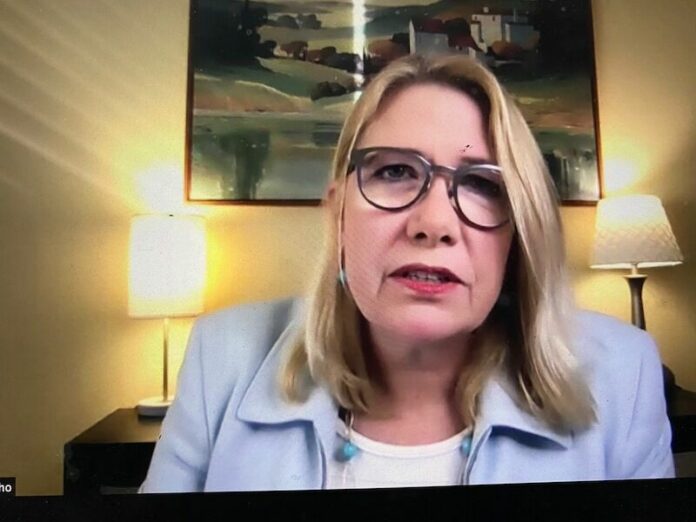Editor’s note: In order to keep this story from being too long, each candidates responses will be presented separately, in alphabetic order.
On March 25, the five candidates vying for a short-term seat on the Windsor Town Council came together virtually to participate in a forum hosted by the Windsor Chamber of Commerce and the League of Women Voters, and moderated by local personality Pat Kerrigan.
Oscar Chavez, Julia Donoho, Jeffrey Leasure, Rosa Reynoza and Cody Wilson all took turns sharing their vision and ideas with the 138 tuned in voters in their bid to take over Dominic Foppoli’s former at-large town council seat, vacated when he was elected mayor last fall.
The special election will take place via mail-in ballot only, with the first ballots arriving in mailboxes April 5 and due no later than May 4. The last day to register to vote in the election is April 19. The seat will be up for regular election in the fall of 2022, meaning the winner of the special election will be seated for approximately 17 months.
Due to the town transitioning to district elections, the winner of this special election will be able to run in 2022 only if they live in one of the districts up for vote in that election. Because this seat is still an at-large seat, any town resident is eligible.
The forum allowed candidates to make a two minute introductory statement, then gave them two minutes to answer questions sent in by residents ahead of time, followed by a one minute closing statement.
The questions covered familiar territory, including COVID pandemic recovery, the Town Green civic center project, equity and social justice, affordable housing and development, how to spend the Lytton tribe’s $16.5 million community benefit grant, disaster preparedness and how to strike the balance between small-town feel and the need for economic development, specifically tourism.
Julia Donoho is an architect and lawyer, who has lived in Windsor for 16 years, and has worked with the county as a construction manager, general contractor and attorney. She ran for town council in both 2006 and 2016, and has previously sat on the planning commission.
“What unites us as candidates is that we all love Windsor and we all bring special skills to table and special relationships,” she said in her opening statement.
She called the COVID-19 pandemic an “interesting situation that the world has never faced.” She cited the adaptability of Windsor and its residents, and said that she herself had felt more driven to get food from restaurants during the pandemic.
“In addition to resources from the federal government and the state we should promote more family-friendly activities at the Green to make sure people are going down there and helping those businesses thrive,” she said. “But we should also take advantage of what is available in our light industrial area. You can get a smog test, buy (animal) feed and get your tractor repaired without leaving town and we should make sure people know all know what can do in town.”
She also believes shifting society due to the pandemic can be an advantage to a town like Windsor, “A small town with all those amenities, in a world shifting to remote work, is at an advantage.”
While Donoho neither endorsed nor spoke directly against the Town Green civic center, she made clear that she thinks any project there can only work with consensus. She referenced a previous project in another town she had lived in where they needed a new civic center, but they faced similar issues. In that case, she stated she was part of a “consensus committee” to find out what the residents really wanted and what the town staff really needed.
“Once that vision was built by consensus, the money flowed,” Donoho said. “The project has gotten off track, hasn’t focused on designing towards us. We should be looking at the Green as we own it should reflect our values. And I think the civic center should be on the Green.”
Donoho said she hoped to lead the council in determining “how we provide equitable services as a town.” She also would like a pay equity audit done for the town, so that the council and staff are “leading the town by example.”
With her professional experience, Donoho had a lot to say on issues of affordable housing in Windsor, especially as it pertains to the town consistently not hitting its Regional Housing Needs Allocation (RHNA) numbers for several years.
“Housing and urban development has been my bread and butter for 30 years and meeting RHNA standards is not something we can avoid forever,” she said. “We have a crisis in Windsor now, we have some homes with five families living in them and that’s causing a lot pressure to surrounding neighbors. Projects get set aside and put off in a corner and people don’t get services, and those people are not getting equitable services, and that ties into equity and social justice.”
She pointed out the changes in housing policy — like those around building accessory dwelling units — that came in the wake of the 2017 Tubbs Fire, and said that that was the kind of thinking that needed to be taking place. She also suggested projects like building a tiny village on the grounds of the Windsor Creek elementary school to provide housing for new teachers.
When considering the large gift from the Lytton tribe, she was concerned about maintenance costs versus the capital expenditures, and felt strongly that community consensus for the project, whatever that may be, should be created. She felt that that could be tied into the parks master plan project that’s currently underway. She also floated the idea of partnering with a group like the YWCA to help with long term costs.
When it comes to disasters, she cited her experiencing helping design the county’s emergency operations center, and also stated that vegetation management should be a cornerstone of any planning.
“We need to create community firebreaks through landscape maintenance. I want to work with (county supervisor James) Gore to make sure we’re addressing defensible space on the edges of our town … (which) made it possible for our chief to do a fabulous job and why our town was saved,” she said, adding she has heard from some residents about concerns on vegetation management in local creek beds, another things she wants to address.
Donoho doesn’t think there needs to be an inherent conflict between tourists and a family-friendly town, if consensus can be reached. She thinks having a variety of businesses as well as keeping the small-town feel, is a way to both attract tourists but keep the lifestyle Windsor residents love.
“What unites us that we all love this town and want to see it grow and prosper and everyone have fulfilling life, I am a supporter of development but must develop correctly, one bad mistake will be irretrievable,” she said. “We have to make it work for all of us.”









